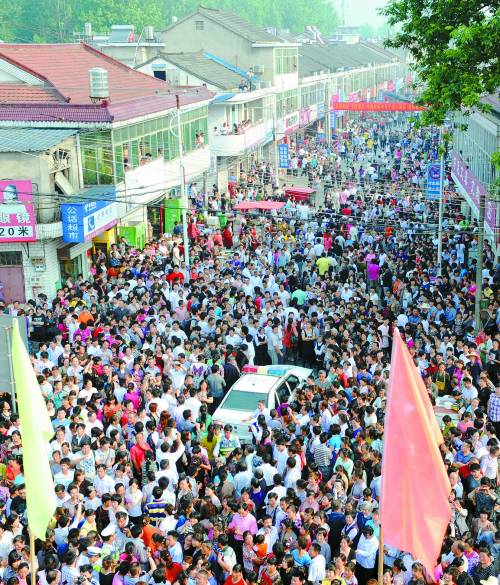Maotanchang: a town living on Gaokao
- By Lin Liyao
 0 Comment(s)
0 Comment(s) Print
Print E-mail China.org.cn, October 3, 2013
E-mail China.org.cn, October 3, 2013
|
|
|
Maotanchang |
After bumping up and down along a winding trail for several hours, 19-year-old Zheng Hanchao finally arrived at Maotanchang, a small town in the mid-west part of Anhui Province. Here, he will spend the following nine months to prepare for his second Gaokao, or the national college entrance exam.
Yet what really surprised him, was that the place seemed to be a ghost town as the streets were empty and shops and restaurants were all closed.
However, after several days, everything in the small town seemed to wake up again on August 29, the day on which the town's cram schools started their new semester.
"It's unbelievable," said Zheng, "The town is just like a cell phone which has the capability to switch modes: sound on or off."
For local residents, on the other hand, it's become very common to see this kind of switch occur twice a year as cram schools make up the core of the entire town of Maotanchang.
Magic schools 'ensure' students enter college
Maotanchang is a small town located in the southeastern part of Liu'an City. With its township area of only 3.5 square kilometers, the original population of the town is about 5,000.
When school starts again every August, the resident number in the area surges to some 50,000, over 20,000 among whom are middle school students; another 10,000 are accompanying parents from nearby towns and cities.
The two schools attracting these massive student influxes are Maotanchang Middle School and Jin'an Middle School. The former one is a public school established in 1939 during the Anti-Japanese War; while the latter is a joint venture school founded in 2005 by Maotanchang Middle School and a local private middle school.
Over the past decade, enrollment rates at these two schools have been more than 80 percent each year. In 2013, a combined total of 11,222 students from both schools participated in the national college entrance examination; 9,258 of them achieved the required grade to enter college.
Thanks to their ultra-high enrollment rate, thousands of parents from Anhui and other provinces across the country are eager to send their teenagers, especially those who failed to obtain the necessary score during the previous year's Gaokao session, to the small town in order to make "huge" progress after one year of studying.
In the mind of many a parent, as long as their child can study at one of these two "magic" schools, he or she has already made their way into a university.
School becomes the core and economic engine
In order to provide better services to all students and their parents, the town's local government has built a range of infrastructures in recent years, including a 3.5 kV transformer sub-station, a 3.4 hectares refuse landfill and a sewage treatment plant with a daily capacity of 5,000 tons.
Furthermore, it has shut down all internet bars, coffee shops or Karaoke rooms in the town, because the parents believe that those places of entertainment are detrimental to their children's focus.
"The entire town lives on the two schools," said Yang Huajun, office director of the local government, "For us, these two schools are not only core of Maotanchang, but also the engine which can stimulate the local economy."
With more and more nonlocal parents moving to the small town, the hotel and real estate industries have undergone great development in recent years.
The average annual rental rate has now gone up to more than 12,000 yuan, with the cheapest place going for some 4,000 yuan; the most expensive ones will cost you more than 20,000 yuan a year.
As a result, to earn 200, 000 to 300, 000 yuan in a single year proves no difficulty for local residents, as long as they have some apartments to rent out.
Besides taking care of their children, many accompanying parents work in the town's clothing shops and manufacturing factories, providing abundant human recourses for local companies.
According to Yang, several large clothing enterprises are planning to set up manufacturing plants in Maotanchang. "We never worry about labor shortage," Yang said proudly.
In 2012, the town's fiscal revenue reached almost 15 million yuan, four times the number of neighboring Donghekou town.
Yang said that some years ago, Maotanchang still relied on selling tea and bamboo. Nowadays, however, the town has found a more suitable and effective mode of development: the so-called "campus life" business.
Just as Mayor Han Huaiguo once told the media, "The relationship between the school and the local government is like that of a family. Any of the schools' needs, are the town's needs as well. All residents and government officials in Maotanchang have tied our own lives tightly to the two schools."







Go to Forum >>0 Comment(s)